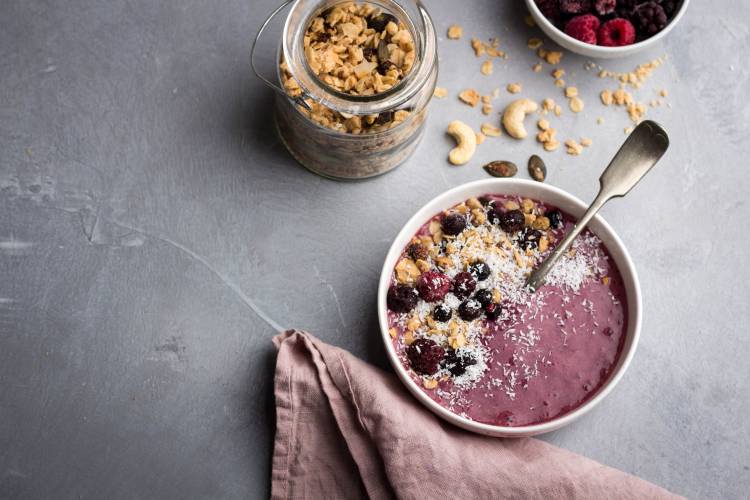Nut butters are all the rage these days with options spanning from the classic peanut butter to the more exotic coconut butter. Find your new favorite with our ultimate guide.
*Note: Nutritional values are based on the average 2 tablespoon serving size.
Peanut Butter
The age-old classic peanut butter is something most are familiar with. Just saying “peanut butter” conjures images of yummy homemade peanut butter and jelly sandwiches! Peanut butter is packed with protein and is high in poly- and monounsaturated fats. This creamy, rich and classic flavor makes it a healthy addition to things like oatmeal, smoothies, baked goods and more.
Nutritional Value: Calories: 188 | Total Fat: 16g | Polyunsaturated Fat: 4.4g | Monounsaturated Fat: 8g | Potassium: 208mg | Total Carbohydrates: 6g | Dietary Fiber: 1.9g | Sugar: 3g | Protein: 8g

Almond Butter
Almond butter can be used for many of the same applications as peanut butter, but it has a slight nutritional advantage. It offers about the same amount of protein per each two-tablespoon serving, but packs in more calcium, magnesium and monounsaturated fats. Almond butter has a mild flavor and creamy texture that is works well as a spread.
Nutritional Value: Calories: 196 | Total Fat: 17.8g | Polyunsaturated Fat: 4.4g | Monounsaturated Fat: 10.4g | Potassium: 240mg | Total Carbohydrates: 6g | Dietary Fiber: 3.2g | Sugar: 1.4g | Protein: 6.8g
Cashew Butter
Cashew butter is a light and sweet nut butter that is full of monounsaturated fat. It has a rich cashew taste and smell and is thin, meaning its easy to spread on just about anything you’d like! Additionally, cashew butter can be a great addition to sauces or curries and can be used as a vegan cream cheese or sour cream alternative.
Nutritional Value: Calories: 194 | Total Fat: 17g | Polyunsaturated Fat: 4.2g | Monounsaturated Fat: 8.6g | Potassium: 144mg | Total Carbohydrates: 9.6g | Dietary Fiber: 1g | Sugar: 3g | Protein: 3.8g
Sunflower Seed Butter
Sunflower seeds aren’t a traditional base for a nut butter; however, they may make a great alternative spread for those with a nut allergy. While all nuts are seeds, not all seeds are nuts!
Sunflower seed butter has a similar texture and nutritional value to peanut butter and has a common presence in grocery stores. It has an earthy, bold flavor profile and in addition to nut butter and jelly sandwiches, can be added to salad dressings and vegetables sauces.
Nutritional Value: Calories: 198 | Total Fat: 17.7g | Polyunsaturated Fat: 3.1g | Monounsaturated Fat: 12.5g | Potassium: 184mg | Total Carbohydrates: 7.5g | Dietary Fiber: 1.8g | Sugar: 3.4g | Protein: 5.5g
Macadamia Nut Butter
Macadamia nuts can be used as more than a cookie ingredient. The macadamia nut is also known as the Queensland nut in part because it is native to Australia, though its largest exporter is now Hawaii.
Macadamia nut butter is lower in protein than other nut butters and instead of a nutty taste, offers a floral, buttery and tropical flavor. It’s ideally used as an alternative to butter as a spread or on desserts as a creamy, rich topping.
Nutritional Value: Calories: 195 | Total Fat: 20g | Total Carbohydrates: 4g | Dietary Fiber: 2g | Sugar: 1g | Protein: 4g
Pistachio Butter
If you’ve seen pistachio butter on your store shelves, there’s a chance you may have mistook it for basil pesto thanks to its earthy green hue. Pistachio butter is lower in fat than other nut butters but still packs in the average amount of protein. It has an herbal, earthy flavor that is ideally blended with cheeses and creams to make a delicious dip, or ironically enough, can be used as a base for a homemade pesto recipe!
Nutritional Value: Calories: 156 | Total Fat: 12g | Total Carbohydrates: 8g | Dietary Fiber: 3g | Sugar: 2g | Protein: 6g
Walnut Butter
Walnut butter is thicker and drier than typical nut butters, making it more difficult to spread if used by itself. It’s not the nut butter highest in protein, but it does offer consumers valuable omega-3 fatty acids.
Walnut butter is earthy and buttery with a strong, almost bitter flavor. It pairs well with sweet dishes featuring chocolate or cinnamon to balance its powerful natural flavor.
Nutritional Value: Calories: 210 | Total Fat: 20g | Potassium: 142mg | Total Carbohydrates: 4.4g | Dietary Fiber: 2.2g | Sugar: < 1g | Protein: 4.8g
Coconut Butter
Coconuts – like sunflower seeds – aren’t nuts, yet they make a delicious alternative nut butter spread. Unlike coconut oil, coconut butter is created using the coconut’s flesh. Coconut butter offers lauric acid, which is great for helping you maintain your natural energy levels, however, its does have a high fat content and the most calories per serving of nut butter options. Coconut butter has a tropical flavor and creamy consistency, making it suitable vegan alternative for butter in any recipe.
Nutritional Value: Calories: 211 | Total Fat: 21g | Polyunsaturated Fat: < 1g | Monounsaturated Fat: < 1g | Potassium: 174mg | Total Carbohydrates: 7.6g | Dietary Fiber: 5.2g | Sugar: 2.4g | Protein: 2.2g
Check out BIOVEA’s selection of nut butters online now!
Which nut butter is your favorite?
Tags: almond butter, alternative nut butters, BIOVEA, cashew butter, coconut butter, guide to nut butters, hazelnut butter, macadamia nut butter, nut butter guide, nut butters, peanut butter, peanut butter alternative, pistachio butter, sunflower seed butter, walnut butter




Comments For 'The Ultimate Guide to Nut Butters from Almond Butter to Sunflower Seed Butter'